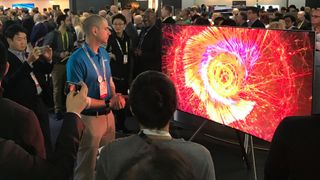If you've been looking at TVs in 2018, you've probably come across the acronym QLED (either pronounced Q-L-E-D or 'cue lead'). It's incredibly common because it's a proprietary technology developed by the world's most popular TV maker by volume – Samsung – and includes all of its top-tier TV models.
If you've heard about it from a friend or a sales rep, you may have been lead to believe that QLED is some sort of opaque future technology that's come for the head of OLED and will radically shake up the TV industry. It's not and it hasn't.
Instead QLED is an LCD-LED TV with a metallic quantum dot film that enhances color and contrast, supporting technology like HDR and 4K by making QLED TVs brighter and more colorful than other non-quantum dot LCD-LEDs.
There's a little more to it than that (QLED models now include Samsung's Bixby virtual assistant and a nifty Ambient Mode to help them blend into your room better) but what you just read is the crux of what makes a QLED a QLED.
Of course, it hasn't helped matters that QLED sounds similar to OLED – which, either intentionally or not, that often causes confusion for most folks.
We'll cover the differences down below and highlight what makes QLED a neat evolution of basic LCD-LED TVs, but the basics are all laid out above.
What is QLED?
It's a bit of an enigma, to put it lightly. Literally QLED means – or we suppose it means – quantum dot light-emitting diode (QLED, not to be confused with OLED TVs), but this Samsung-baked concept is basically just the latest set of enhancements to the same quantum dot technology that the company has been working on for the past few years.
Technically speaking, Samsung's QLED TVs are not QLED at all, well, at least in the way that we understand the term. A 'proper' quantum light-emitting diode element emits its own light – the clue is in the name – whereas Samsung's latest TVs use a separate LCD backlight (and an edge-lit backlight, at that) just like any other LED-LCD TV. So where the QLED moniker comes from, we're not sure.

How does a QLED TV work?
It's complicated, but hang in there with us. So, to start, all QLED TVs have a quantum dot filter. This year, there's a new refined aluminium compound that help make the dots more efficient (and therefore brighter) and more effective at passing pass light through, which creates wider and more accurate colour.
So what is a quantum dot filter exactly? It's a film of tiny crystal semi-conductor particles that can be precisely controlled for their colour output, which replace the red, green and blue colour filters that old TVs used.
Samsung says that its QLED TVs use the new filters to display 100% coverage of the DCI/P3 color space (read: much deeper black levels and sparkling HDR), and maintain that performance whatever the brightness.
They're so bright, in fact, that Samsung's QLED TVs can manage anywhere between 1500 nits to 2000 nits brightness. Considering 1000 nits is needed to produce HDR, that's proper bright, though exactly how anyone could stand the glare of 2000 nits, we're not sure. Sunglasses, anyone?
While the advances in brightness are intriguing, Samsung claims that the new QLED TVs have a newly designed pixel panel structure to allow better off-axis viewing. For a living room environment, that could be QLED's big selling point.

QLED vs LED
Beyond the 'paradigm shift' hyperbole of Samsung's marketing, it's really important to understand that QLED isn't really anything new at all. In fact, it's really nothing more than the latest – possibly among the last technically possible – tweaks to existing LED-LCD technology that's dominated bigscreen TVs for the last decade.
QLED's innovations – deeper blacks, better colours and wider viewing angles – tackle three traditional problems of LED and LCD technology, but they're the same problems that are addressed year in, year out by TV makers. Only upcoming reviews will reveal if, in fact, QLED is a significant step forward from traditional LED-LCD screens – but chances are good that we'll see some real improvements in these areas with Samsung's new sets.
QLED vs OLED
Perhaps a more important comparison is QLED vs OLED. The latter uses pixels that emit their own light, but OLED displays are manufactured only by Samsung's arch-rival LG, and now used by Sony, Philips and Panasonic, too.
There's no doubt that QLED, for now, has an advantage in terms of brightness (so in theory may better handle HDR content – though might just as easily overcook it), but if you're looking for a 'paradigm shift' in picture quality and the next-gen display technology, OLED is still the frontrunner. The latter uses individually lit pixels to achieve better contrast ratio and richer blacks that LED-LCD will never be able to hit, quantum dot filter or no.

What happened to SUHD?
QLED and SUHD are essentially the same thing; the new messaging is more about marketing than technology, although the jump from 1000 nits on the top-end SUHD TVs to 1,500 to 2,000 nits on the flagship QLED TVs is perhaps more revolutionary than it seems at first. Put simply, for a buying public still getting to grips with what UHD is, SUHD just proved too confusing, so Samsung has dropped it. (It also probably didn't help that the 'S' in SUHD didn't really mean anything ... although we're not convinced that QLED is much clearer.)

Should I buy a QLED TV?
Samsung's QLED TVs are claimed to be all about the brightest possible, most accurate coloured images pictures, which therefore work with all kinds of content in all kinds of lighting conditions. Although we can't yet confirm Samsung's claims that its QLED TVs are the brightest and best around – our upcoming reviews will confirm or deny that – they do appear to be as much about design and flexibility of installation as about picture quality.
That all seems a decent package for the living room, but whether you should buy a QLED TV will ultimately come down to price. And here comes the crux of the matter; will QLED TVs be cheaper than OLED TVs? They may need to be to stand a chance, but is Samsung really going to make itself a cut-price brand? We seriously doubt it. Expect oodles of marketing that make QLED seem a better option than OLED, though whether it is or not, only time will tell.





No comments:
Post a Comment